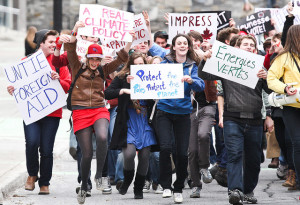Young ethnic minority people are citizens to be engaged in politics, not a problem group
As part of our series on youth participation, in this post Therese O’Toole considers how young people from ethnic minorities engage in politics. She argues that this group is not more likely to be disaffected from politics, only from mainstream forms of politics, and tend to engage in more ‘DIY’ forms of activism. Traditional institutions need to respond to this, she argues, and stop defining ethnic minorities as a political problem to be solved.

Young ethnic minority are not less engaged in politics than other young people. Credit: lottie45, CC BY 2.0
In the anxious debates about youth political apathy in the UK, connected to low levels of electoral participation among 18-24 year olds since 2001, it is suggested that ethnic minority young people are even less likely to turn out to vote compared to young people generally or older ethnic minority groups, and that they are less civically engaged. In the aftermath of the 2001 riots and the 2005 London bombings, such narratives increasingly focused on young Muslims, centred on concerns about political disaffection, failed integration, a lack of social capital consonant with democratic participation, or violent political extremism. Such concerns have been expressed in other European states also.
The view that political disengagement is more pronounced among ethnic minority young people is challenged by the recent Ethnic Minority British Election Study (EMBES) of engagement among ethnic minorities in the 2010 General Election, which found that whilst age was a significant factor determining turnout across all ethnic groups, the effect of age was actually weaker among ethnic minorities than for White British (Heath et. al., 2011, 262). Analysing data on patterns of political participation among ‘immigrant youth’ in Belgium across a range of repertoires of political action including voting, party membership, protesting, boycotting and ‘buycotting’, Quintelier (2009, 929) found that migrant youth of non-European backgrounds were ‘the most politically active group, ahead of both Belgian and European immigrants’. Her work also dispels views of young Muslims as politically disaffected, finding high levels of activism among young Muslims, and – contrary to prevailing perceptions – Muslim young women especially.
This finding echoes recent events in the UK in relation to some successes of the Respect party, which achieved electoral victories in areas of Muslim settlement, where the activism of young Muslims, and especially Muslim young women, were notable features of the campaigning. The perceptions of lower levels of political participation among ethnic minority young people, then, are not well substantiated, whilst those studies that do exist do not necessarily sustain generalised ‘crisis’ narratives. Between apathy and extremism, however, lie a range of forms of political action that require a broader account of political engagement.
Changing patterns of participation
There is a set of literatures suggesting that declining levels of electoral and party participation in established democracies sit alongside increasing levels of engagement in civic, voluntary, or other informal modes of political engagement. Seen from this view, political participation is not so much declining as changing. This has led to new horizons in political participation research focusing on: informal and ‘DIY’ modes of participation; lifestyle activism (e.g. political shopping); virtual forms of activism; or direct engagement through forms of networked governance. Some argue that these forms of participation are particularly prevalent among the young.
Debates on, as well as the study of, ethnic minority or Muslim young people’s politics have generally not been connected to these analyses of shifting trends in citizens’ political participation. Data from my research with Richard Gale (O’Toole and Gale, 2013), on ethnic minority young people’s political engagement, however, demonstrate their relevance. We found very diverse repertoires of action among our respondents, including but also beyond electoral engagement, and perspectives on engagement that support arguments concerning the emergence of ‘new grammars of action’. Whilst our respondents did engage with mainstream politics, they were not strongly engaged in this arena. Despite having often very full political biographies, few saw electoral or party politics as the main terrain for the expression of their political interests.
Politically interested and knowledgeable, many of our respondents were sharply critical of the quality of participatory opportunities offered via electoral and party politics and sceptical of the capacity or willingness of political institutions to address the issues that concerned them. Instead, respondents tended to prefer more personal, immediate and DIY forms of action, rather than through vertically integrated institutions of representative politics, and this was expressed in their orientations towards quite localised, everyday and online forms of activism. Even when activists in our study involved themselves in formally constituted political organisations, such as political parties, they tended to do so in ad hoc ways, without formally joining or submerging their identities in such organisations.
Online activism
For many activists, the possibilities for direct, everyday forms of action were greatly facilitated by access to web-based forms of activism. There is research suggesting that globalised forms of communication and networking have made internet based political action increasingly significant, and, facilitated by new technologies, contemporary forms of action are increasingly concerned with global issues. An important aspect of this development is the enhanced scope for networking, consciousness-raising and DIY activism. In our study, activists’ use of Information and Communications Technology (ICT) was important in facilitating more direct forms of engagement with global and international issues, and these captured the imaginations of many activists – in ways which found little equivalence at the level of national politics.
Importantly, engagement with global issues was not solely an outcome of diasporic ties, in which ethnic minority young people engaged with the issues and politics of their countries of heritage. Whilst these were often important, engagement was also underpinned by more globalised orientations, made possible through the use of ICTs, which: enabled access to a range of media and information sources; enhanced possibilities for creating and disseminating, rather than only consuming, political information; enhanced their capacity to campaign with little need to invest in organisation-building; and facilitated engagement in personalised, networked forms of activism.
Identities and new grammars of action
Our research found that ethnic and religious identities were significant in animating political action among our respondents – not least as a consequence of their experiences of being externally categorised in relation to ethnicity, race or religion. Thus, for many, experiences of racism, or pathologising discourses on ethnic minorities or Muslims, were politicising. This was manifested, for example, in activists’ responses to policing practices – particularly stop and search and use of counter-terrorism powers, which had directly or indirectly affected a very large proportion of our respondents – negative schooling experiences or in relation to stigmatic public discourses on Muslims or areas of ethnic minority or Muslim settlement. Such experiences tended to compound a sense of dissatisfaction with, or alienation from, mainstream public and political institutions.
A notable finding was the significance of religious, particularly Muslim identities, in animating political activism, and in ways that stood apart from ethnic or cultural ties. The events of 9/11, the war on Iraq, or the 2005 London bombings and subsequent counter-terrorism measures and public and media discourses on Muslims and Islam, were cited by many as politicising experiences. Additionally, many cited Islam as a framework giving meaning and substance for linking personal ethics and political action, sometimes in ways that provided legitimacy for political activism in the face of parental opposition, e.g. by referring to Qur’anic principles to counter culturally derived objections.
Whilst activists’ political commitments were often framed by ethnic or religious identities, these were not exclusive commitments that were incompatible with identification with Britishness, or with commitments to broader political communities or ideals. For example, whilst concerns with global issues, campaigns or organisations might be underpinned by a concern with Muslim values, or identification with a broader Muslim community (the umma), this was typically not confined to Muslim issues or societies, but linked to broader issues such as the international terms of trade, debt, development, humanitarian and emergency relief, or the maldistribution of resources globally.
Conclusion
Ethnic minority and Muslim young people have become increasingly visible in public debates that have focused on political disaffection and – in the case of Muslims – on political extremism. Yet, neither of these claims is particularly well-substantiated by empirical data. Furthermore, the significance of varied repertoires and modes of activism can be obscured by a conceptual focus on forms of mainstream and electoral participation alone. The experiences of activists in our study demonstrate grammars of action that are founded in: a preference for hands-on, direct forms of activism; a tendency to mobilise in horizontal, loosely organised groups or networks rather than vertically integrated institutions with highly formalised regulation of membership or activity; engagement with concrete projects rather than abstract debate; personalised (rather than individualised) modes of interaction that do not require activists to submerge their identities into formal organisations; and above all a politics founded on the scope for activists to make a difference.
Lack of engagement in mainstream politics certainly matters in democratic terms, but, I suggest, the possibilities for connecting young people with mainstream political institutions rest in the capacity of those institutions to adjust participatory opportunities to these flatter, more networked, personalised, ‘DIY’ forms of activism. Political institutions need to engage with young people from ethnic minority and religious communities on concrete issues and campaigns in which they can be directly involved (on- and off-line), rather than on inviting young people to increase membership, organisation-build, or participate in mock-political youth structures that are disconnected from actual decision-making.
Furthermore, participatory opportunities for ethnic minority and Muslim young people need to focus on engaging them as citizens, rather than as problem groups who are disengaged, poorly integrated or at risk of radicalisation. Traditional approaches to encouraging youth citizenship have often relied on forms of engagement with community leaders or through traditional authority structures. The current under-representation of ethnic minority groups in a range of political institutions continues to undermine their credibility – not because young people necessarily wish to be represented by someone from their own ethnic or religious group. Indeed, our research found plenty of scepticism about such essentialist approaches to group representation. Rather, their lack of ethnic, religious or social diversity tended to undermine young people’s faith in political institutions’ capacity to address the issues that concerned them.
—
This post is part of a series on youth participation based on the Political Studies Association project, Beyond the Youth Citizenship Commission. For further details, please contact Dr Andy Mycock. An electronic copy of the final report can be downloaded here.
Note: This post represents the views of the author and does not give the position of Democratic Audit or the LSE. Please read our comments policy before responding.
—
Therese O’Toole is a Senior Lecturer in Sociology and a member of the Centre for the Study of Ethnicity and Citizenship at the University of Bristol.
is a Senior Lecturer in Sociology and a member of the Centre for the Study of Ethnicity and Citizenship at the University of Bristol.






 Democratic Audit's core funding is provided by the Joseph Rowntree Charitable Trust. Additional funding is provided by the London School of Economics.
Democratic Audit's core funding is provided by the Joseph Rowntree Charitable Trust. Additional funding is provided by the London School of Economics.
Young ethnic minority people are citizens to be engaged in politics, not a problem group https://t.co/L8s7lnUUcX
Young ethnic minority people are citizens to be engaged in politics, not a problem group https://t.co/3R4uNPa2Eu